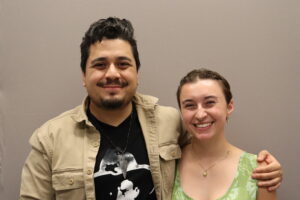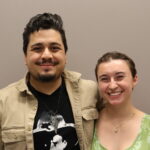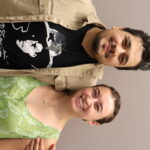Description
Conversation partners Cesar Briones (35) and Manuela Velasquez (23) discuss answers to the question, “What is home?”Subject Log / Time Code
Cesar (C) shares a quick history of Nicaragua with Manuela (M) and describes how he was born in the former Soviet Union.
C tells M about his Fulbright and meeting his wife.
M asks C what "home" means to him.
C talks about what is holding him back from returning to Nicaragua.
M asks C how his life has been different than he expected.
C tells M about Nicaragua.
M asks C what makes Kalamazoo home.
C talks about a dear friend.
M asks C what wisdom he would like to share with future generations.
C tells M about his dissertation.
Participants
- Cesar Briones
- Manuela Velasquez


